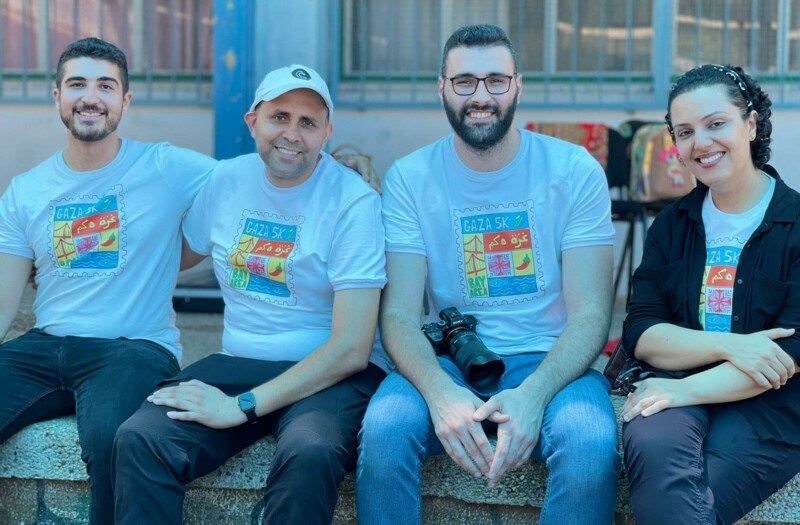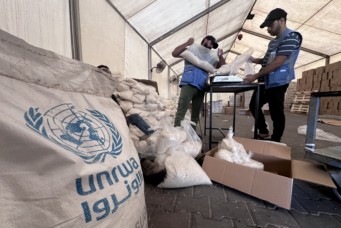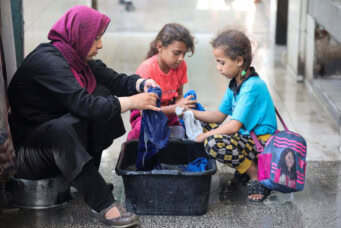Showing Palestine Refugees that Americans Care
The Cairo Review asks the UNRWA USA National Committee questions about its purpose, processes, and operations amid the existential crisis UNRWA is facing.

From left to right: Nahed Elrayes, Hani Almadhoun, Motaz Azaiza, and Amjad Shabat at UNRWA Summer Fun Weeks in the Gaza Strip, July 2023. Courtesy of UNRWA USA.
Since the beginning of the genocide in Gaza following the Hamas-led attacks of October 7, the United Nations Relief and Works Agency for Palestine Refugees (UNRWA) has been playing a critical, humanitarian role in the bombed and besieged Strip. Israel’s antagonistic attitude toward UNRWA and the agency’s vulnerable funding structure have culminated in Israel’s January accusations, void of evidence, that a small number of UNRWA’s staff were involved in October 7. Taken at face value, key donors, such as the United States, suspended funding of the agency’s lifesaving activities.
Based in Washington, the UNRWA USA National Committee is a nonprofit organization working to raise funds for and awareness of UNRWA. Since October 7, and especially since the suspension of funding—which will not be reversed by the United States until March 2025 at the earliest—UNRWA USA’s work has become all the more important, if extremely pressured and profoundly painful.
To understand how UNRWA USA operates in this context, what has changed in recent times, and why the organization does what it does, the Cairo Review’s Omar Auf invited the UNRWA USA management team to a Q&A. These questions were answered by Executive Director Mara Kronenfeld, Director of Communications Laila Mokhiber, Director of Philanthropy Hani Almadhoun, and Director of Strategic Programs Jason Terry.
Cairo Review: What do your day to day operations look like amid the urgent humanitarian crisis in Gaza? In what ways are you able to support UNRWA during this extremely difficult time?
UNRWA USA: In response to the ongoing humanitarian crisis in the Gaza Strip, UNRWA USA National Committee (UNRWA USA) is deeply involved in supporting UNRWA, the United Nations Relief and Works Agency for Palestine Refugees. Our day-to-day operations concentrate on fortifying the frontline efforts of our UN counterparts. While UNRWA navigates an ever-fluctuating state of chaos in Gaza, we at UNRWA USA play a crucial role from the United States, actively mobilizing grassroots fundraising and advocacy to enable and sustain their continued efforts.
Since October 2023, our nonprofit organization has mobilized well over 100,000 grassroots supporters, along with dozens of foundations and community organizations, to provide more than $40 million in relief support for Gaza. These funds have been critical in providing essential food and non-food items for tens of thousands of people. Additionally, we have also included over $2.5 million in funds to maintain the operations of UNRWA’s mental health teams. More than 300 UNRWA counselors are moving among the displaced, providing essential psycho-social support to over 400,000 children and their caregivers.
At the same time, we are leveraging the momentum we have seen in support of Gaza to expand our funding efforts for UNRWA’s other field sites: the West Bank (including East Jerusalem), Syria, Lebanon, and Jordan. Those projects include case management and emergency funding for individuals displaced by Israeli military operations, as well as essential cash assistance for Palestine refugees living in extreme poverty outside the occupied Palestinian territory.
How has the social and political environment you’re operating in changed since October 7? Has there been increased expressions of antagonism or solidarity, and how has this reflected in terms of financial support?
The political environment UNRWA USA has been operating has gotten much worse October 7th, UNRWA USA is currently facing:
- A baseless lawsuit which incredibly accuses UNRWA USA of aiding and abetting terrorism because of its support for UNRWA. This lawsuit targeting UNRWA USA is part of a broad attack on humanitarian aid for Palestinians as famine spreads in the Gaza Strip.
Meanwhile thousands other NGOs working in conflict zones like UNRWA USA or engaged in work that may be susceptible to politicization are also facing:
- H.R. 6408, a bill recently passed in the House that would suspend the tax-exempt status of any US nonprofit deemed to be supporting terrorism, something that is already provided in US law (in the tax code). The bill’s stated aim – to prevent support for terrorism by NPOs – is laudable. However, a close reading demonstrates that this legislation would create an administrative tool easily wielded and weaponized against charities whose work a given administration does not support politically.
When the Biden Administration pulled funding from UNRWA after—evidently baseless—Israeli accusations of UNRWA’s involvement in the Hamas-led attacks of October 7, UNRWA USA also temporarily paused disbursement of funds to UNRWA as a precautionary measure. In April, you resumed funding, citing other countries’ resumption as well as UN reports.
What was the effect of the U.S. withdrawal on your fundraising efforts both before and after you resumed disbursement to UNRWA?
Grassroots support for UNRWA has grown immensely in the wake of the siege of Gaza post October 7, 2023. UNRWA USA’s annual revenue, the vast majority of which is supported by individual U.S. based donors, grew substantially in 2023: it went from an average of $6.2m between 2019 and 2022 to a total of $32.4 m in 2023.
Some of those who work for UNRWA USA are Palestinians who have family in Gaza, such as Director of Philanthropy Hani Almadhoun. His parents remain in the north and his brother runs a soup kitchen, feeding the hungry. On May 8, he wrote that “On a professional level, I have chosen to bury my emotions somewhere deep and put them behind walls. I do this to be able to function, to be their voice, and to share our truth.”
Do you feel that the deeply personal and oftentimes painful nature of the work that the Palestinians within UNRWA USA carry out strengthens your mandate or drives your outreach in some way, especially during this ongoing genocide in Gaza?
The deeply personal and often painful nature of the work, especially for those of us Palestinians on the UNRWA USA team with family in Gaza, undoubtedly strengthens our mandate and drives our outreach efforts in significant ways.
Each one of our team members could not do this work if we did not believe that we needed to step up and help rally people around this cause to get them to act. People genuinely want to help, and it is our role to guide them on how they can contribute effectively. Our fundraising team operates like traffic control; donors see us, and we see them, and mutual trust is essential to deliver for refugees in Gaza.
Setting boundaries during these times is challenging, as crises do not adhere to a weekday schedule. Bad and horrible things happen not just on work days but also on weekends. We feel the need to stay on top of the news and determine the ways UNRWA is responding, so we can prepare the UNRWA USA community to support. Such work can be taxing to one’s well-being, but if UNRWA was not there, not much would get done to support refugees in need in Gaza. We have the honor and the challenge of supporting the largest humanitarian actor inside Gaza. They need resources, but they also need help in awareness building, responding to rumors, and combating misinformation in the United States.
Our connection to our families and communities gives us a profound sense of responsibility and urgency in our work. It fuels our commitment to advocate for those who are suffering and ensures that their stories and needs are brought to the forefront. During this ongoing crisis in Gaza, our personal experiences allow us to convey the realities on the ground with authenticity and empathy, which resonates deeply with our supporters and partners.
While navigating the emotional toll can be challenging, it also serves as a powerful motivator. By channeling our pain into our professional efforts, we can provide a more compelling and genuine voice for those who are enduring unimaginable hardships. This personal connection reinforces our dedication to our mission and helps build stronger, more empathetic relationships with our audience.
“This piece of writing might be the only thing that tells the world I was once here. That I existed.” This was how Amjad Shabat, an UNRWA USA freelance content producer based in Gaza, opened her article published in November on your website. What impact do the stories you share from Palestinians, like Amjad, have on your overall operations?
At UNRWA USA, our goal is straightforward: to ensure Palestine refugees have the UNRWA support they need for as long as they need it. Aid saves lives, and our advocacy work ensures UNRWA remains their lifeline. The real stories from Palestine refugees and from our donors and advocates, are our most potent tools. Without these authentic narratives, others will tell these stories, and the truth can be easily distorted.
During this year’s Nakba commemoration week, we launched an advocacy storytelling campaign accompanied by a call for personal stories. The narratives from our supporters and those who benefited from UNRWA, now residing in the United States, are an integral part of the collective history, legacy, and future of UNRWA, the United Nations Relief and Works Agency for Palestine Refugees. We want to understand what brought people to our nonprofit organization and why they choose to support the rights, dignity, and well-being of Palestine refugees through UNRWA USA.
Centering Palestine refugee voices and incorporating these firsthand accounts into our communications strategy is a major part of our nonprofit’s mission. By sharing these powerful stories, we ensure that refugee voices are heard and their experiences acknowledged.These stories not only amplify the voices of those directly affected but also reinforce the credibility and urgency of our work. They connect those on the ground in Gaza—a place most outsiders will never visit due to the blockade, borders and ongoing violence—with everyday Americans who come across our communications. This connection allows us to build stronger, more empathetic relationships with our American audiences, ultimately driving more effective advocacy and fundraising efforts.
Amjad Shabat, a female writer from Gaza, worked with us as a freelance content producer for more than six months in Gaza before she was evacuated with her family to Egypt. When the crisis erupted in October, our operations faced significant disruptions. Amjad could no longer travel freely or safely around Gaza to gather stories, as hundreds of thousands were displaced and Gaza faced devastating conditions. She herself was displaced and lost her dream home, as she recounts in her story on our Voices of UNRWA blog and UNRWA USA Instagram page. Unable to access the UNRWA sites and refugee camps she once visited for interviews, she chose to share her own personal story. Lacking access to her computer or UNRWA UAS email account, she sent her story through WhatsApp and several voice notes.
Amjad’s poignant words remind our audience of the individual lives behind the staggering statistics, making the crisis in Gaza more tangible. These stories also help counteract misinformation and bring a nuanced understanding of the situation on the ground.
Our other freelance content producer on the ground for most of 2023 was photographer Motaz Azaiza, who is now globally celebrated and known as a key chronicler of the crisis in Gaza. After October, he had to shift from his usual UNRWA USA photo and video assignments, which provided visuals for Amjad’s written interviews, to being out in the streets and documenting the violence and casualties all around them. He did this for about 108 days until he was eventually evacuated as well.
We are currently in the midst of an advocacy storytelling campaign to collect as many stories as possible to continue documenting the Nakba and preserving personal accounts that ensure the truth about the plight of Palestine refugees is told. On June 20, 2024, we will hold a virtual event called “The Children of UNRWA,” featuring a panel of the UNRWA USA Refugee Advisory Council members who will share their personal testimonies from the Gaza Strip, the West Bank, and Lebanon.
UNRWA, the UN Agency, is busy implementing its humanitarian programs on the ground and facing extremely tough challenges to keep going. Since we’re not always in the field except for our yearly visits, they can’t always provide us with stories when we need them for our advocacy work and to help people understand the situation better. So, we often rely on personal stories from our colleagues, like Hani and Nahed from the fundraising team, and what they hear from their families in Gaza.
UNRWA USA is committed to “showing Palestine refugees that Americans care”. Why is it important that Americans care about Palestine refugees and the Palestinian cause more broadly? And who are the Americans that you are speaking to or targeting?
Our commitment to “showing Palestine refugees that Americans care” extends to our grassroots supporters and elected officials whom we seek to influence through our advocacy efforts. Through these efforts, we strive to convey to Americans that supporting UNRWA through their tax dollars aligns with core American principles of humanitarianism and compassion. Despite instances where political decisions have led to the politicization of humanitarian assistance, such as the defunding by the Trump administration starting in 2018 and the statutory pause under the Biden administration earlier this year, advocating for UNRWA funding remains crucial. It’s about upholding our American values and fulfilling our responsibility to support vulnerable populations in need, as tired as that term is. By restoring and maintaining funding to UNRWA, Americans can contribute to a more just and equitable world, consistent with our nation’s principles of fairness and decency.
We believe Americans must better understand and empathize with the seven-decade-long plight of Palestinian refugees and the broader Palestinian cause because it fundamentally speaks to issues of human rights, humanity, and the dignity of all people.
Currently, UNRWA USA is primarily focused on engaging three key audiences: Gen Z, progressives, and philanthropic Americans.
For Gen Z, which is often leading the charge in advocating for social justice and equality, supporting Palestine refugees aligns perfectly with their values. By championing the rights of Palestine refugees, they contribute to a world that prioritizes justice and fairness for all.
Progressives, including those who may still be uncertain about their stance on the issue of Palestine, are another critical audience. Through education and awareness-building efforts, we aim to provide progressives with the information and perspectives necessary to form informed opinions and take action in support of Palestine refugees.
Finally, philanthropic Americans play a crucial role in providing financial support and resources to alleviate the suffering of Palestine refugees. Their contributions enable us to deliver essential aid and services to refugees in need.
As an independent nonprofit organization dedicated to helping Palestinian refugees by fundraising for UNRWA, how do you navigate the complex landscape surrounding the Israeli-Palestinian conflict that exists in U.S. political circles?
We focus on the people we help and tell their stories, trying not to allow emotions and politics to get in the way of our messaging. Additionally, we call on all parties to respect our mission and that of UNRWA’s and not impede our work of theirs. UNRWA maintains a neutral stance, standing equidistant from all actors involved. Instead of assigning blame or getting drawn into debates . While others may label UNRWA as X or Z, we remain focused on the facts, reporting on the situation as it impacts our humanitarian work.
This can be challenging because we are all human, with consciences, values, and families we love. But we always ask ourselves, why should a starving child in Gaza suffer? Our aim is to ease the pain and fulfill our mandate for Palestinian refugees and other internally displaced Palestinians. UNRWA is a lifeline, and nothing should detract from that promise.
What is your outlook for the short-term and long-term in terms of your fundraising efforts and your partnership with UNRWA?
For now, we focus on providing as much as we can as fast as we can to help facilitate UNRWA’s absolutely vital relief work. In the short term, people need shelter, food, water, and sanitation, and in the long term they would still need all those things but also schools and jobs.
UNRWA is unique because, sadly, the organization has been around for 76 years, and it is geared from cloud computing to ground support. While this is certainly an unprecedented situation on every level, UNRWA can accomplish big things for the communities it serves if the funding lines up it has
Longer-term, though, the devastation in Gaza, as well as in the West Bank, is going to take over a decade to address. In the West Bank, expanded military operations and settler violence, along with heightened work and travel restrictions, have put tens of thousands in need of shelter and income. In Gaza, where almost the entire 2.2 million person population has been displaced, vast quantities of trash and rubble will need to be disposed of to enable a reconstruction effort that has already been estimated at a minimum of $50 billion. That includes nearly every school, every hospital, every university, and all manner of public works infrastructure, along with at least 80% of housing stocks. To rebuild, we will likely need to see a massive wealth transfer not seen globally since the Marshall Plan after World War II. So, we’re preparing our donors and funders to make long-term commitments to the lives and livelihoods of Palestine refugees.





